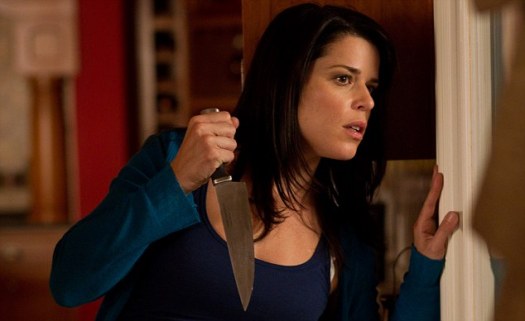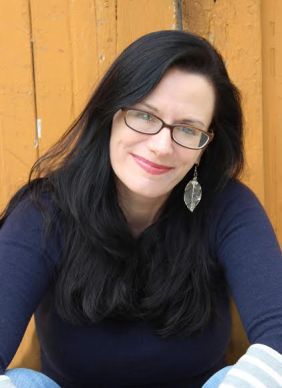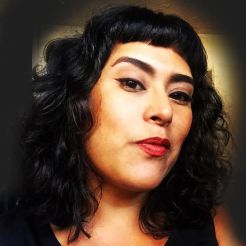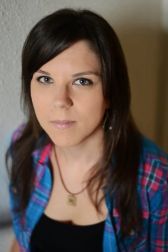by Kate Maruyama

Eight years ago, I had two small kids and had sunk whole-heartedly into the motherhood thing. I was working reading scripts for money, which I did at home after the kids had gone to sleep. I was writing screenplays because that’s what I always did, but otherwise I didn’t have to see people much or be out in the world. I loved my kids, and that part of my life was all consuming, exhausting, hilarious and exhilarating, but I had unwittingly cut off an entire part of myself. My brain was occupied with planning meals, organizing around toddler sleep patterns, childhood illnesses and, honestly, thoughts of when which kid had pooped last. It was easier to call myself a stay at home mom than a failed screenwriter. Somewhere along the way, I lost track of my thinking self.
But when my youngest was about to go off to kindergarten, and my screenwriting career hadn’t so much happened, I got overwhelmingly and completely depressed. This was not helped by the fact that my five year old daughter asked, “Why do Daddies work and Mommies stay home?” My own daughter, who was meant to be a third generation feminist, was making sense of the world in a way I hadn’t envisioned at all. My idea of a career had all but evaporated and the script reading work was on the wane, reducing my monetary contribution to the family considerably.
What could I possibly do next? What at all did I have to offer by way of career or even basic income? Despite my extensive experience in the film industry and in screenwriting, I learned that I couldn’t teach screenwriting without a Masters. Going to grad school in something I’d spent fifteen years working at and feeling like a failure at felt defeatist. A friend told me about Antioch’s MFA in Creative Writing program and my first knee jerk reaction was, “I can’t do grad school! I wasn’t even good at college! How could I do grad school?” Everything I thought of was met with a fearful, internal, “no.” Finally, I went down to campus for an informational meeting, and learned about Antioch’s social justice mission and its focus on creating a writing life. It felt like coming home. So after having written one pretty terrible novel on my own, I applied. I needed schooling. And I needed to start saying yes, even though I was afraid.
Only when I came home high from my first residency, a ten day whirl of writing workshops, lectures, new friendships, from using my brain again, from being completely consumed in thoughts, words and concepts, did I realize how afraid and cut off I had become over the past several years. It wasn’t something that happened all at once, when I had my kids. I certainly can’t blame them. Instead, it crept up on me. I fell out of touch with my pre-kid friends. I backed away from opportunities for reunions with people I used to work with. I became better acquainted with cable television, which grocery stores to hit and doing all of my work online so as to avoid personal contact. Early bedtimes. I was writing less. All of the goals I had set for myself in my twenties had come and gone. As a result I had simply shut down. For some reason it felt easier and more comfortable to resign myself as a failure than to risk actual failure.
But after that first residency, with my brain reawakened, my need to write rekindled in fiction, I could see that this trap into which I’d fallen had happened too easily because of fear. I felt like I’d lost a decade of forward movement to that fear, and I wasn’t going to do that ever again. Here I was at forty, finally at an age where fear was no longer an option, starting a new career all over again.
So often I had put things off with, “I can’t. I don’t think I can,” or, “I couldn’t possibly be qualified to…”
I have learned that one way to trick the brain past these fears is to sign up to do something well in advance of having to do it.
Instead of waiting for a place of comfort, where I knew I was prepared and ready, I started promising to do things before I could fully wrap my mind around actually doing them. This worked because, the way I was raised in New England, backing out of something you’ve already signed up for isn’t really an option. Signing up for something out of my reach was a bit like a dare to myself. Learning to say “yes,” before I was certain I was ready.
So, knowing I was terrified of public speaking, at the next residency in my MFA program I signed up for a “brown bag reading.” I would get up and read my writing in front of other students. I had never done this before. The week before the reading, I practiced and practiced and timed it and when the day came, my voice did a weird warbly thing, and I lost my place twice and broke into a flopsweat, but I got through it. When I finished, I resolved to sign up for another one six months later.
I was working on a novel, but had come up with some short stories along the way. The idea of having them read and judged by strange editors was terrifying. But I realized that all of the published writers in my program had actually submitted their work to journals in order to get it published. You may laugh, but that’s a leap of logic a lot of fearful writers don’t always understand. If publication is validation, and if you feel like you don’t belong because you aren’t published, you actually have to submit your work places to have it read and rejected in order for it to be published. You have to put your work out there.
No one was going to write to me and ask me for a story and my finished stories, already read by mentors and peers in my program, were not going to get into journals by osmosis. I had to put my work in front of actual editors. So I set myself up with Duotrope. The lists of journals upon journals were overwhelming until I figured out the filters, but I finally had it wired and submitted my story to one place. I believe I took a nap afterward.
It didn’t take me long to realize I was sitting around waiting for an answer on this story. One thing it’s taken me many years to learn as a writer is: Waiting is not an activity. This magazine cautioned that responses could take up to six months. When the next Saturday rolled around, I submitted my work three more places. Soon I got into the ritual of submitting. I submitted three short stories a total of 70 places before I got my first publication.
A friend asked me to contribute to an article about my work as a woman screenwriter. I felt I had no place to speak on the matter as, in my mind, I had failed in that endeavor, but I said yes. I sat down and wrote her something. It turned out I had a lot to say.
Another friend asked me to speak at her high school about the glass ceiling for women in the working world. It was a subject we had talked about in passing. I felt I had no place to speak out on such a subject, but said, yes. Over the course of the next few months, I worked up a lecture and slideshow that followed my mom’s work as a reporter in the fifties and tracked all the way up through my work in Hollywood. The talk was pretty good and I learned a great deal in putting it together. The students were fantastic and responsive, and I realized that saying yes before I was ready was a fantastic challenge and pushed me out of my comfort zone.
Saying yes WHILE afraid is now my modus operandi.
Will you write a genre story to submit to this anthology on a specific subject? Help! I can’t come up with a story on command, are you kidding?? Yes. Even though it wasn’t included in the anthology it was requested for, had I not said yes, the story would not have been written and placed into a different anthology of which I’m quite proud. Will you be on a panel at a writers conference with people who know so much more than you about a subject? Yes. Turned out I had useful information on submitting work as practical and useful for the writers at the conference as the words of the more experienced New Yorker published writers I was sitting with and felt less worthy than. Can you submit a Christmas-related horror story for our anthology? Are you out of your mind? How can I come up with a themed story in a month? Yes. Another story that wouldn’t have happened in a collection that seems to be doing well for itself.
I was asked to come up with the book coaching program for inspiration2publication.com through my alma mater. Terrified and feeling underqualified, I ignored my inner “No” and said yes, and it turned out I was exactly the right person for the job. My years of experience giving screenwriters notes in the film industry complete with the work I’d done with students and fellow writers made me ideal. While I squinted my eyes shut and repeated, I belong at this table, I belong at this table, I belong at this table, I not only put the fear behind me but grew the job into something I love to do and believe in.
Pushing past that resistance is essential.
OLLI talks, Cal State Fullerton, runs inspirational talks for retirees. They asked if I would do a 90 minute talk about writing in their 150 person auditorium. I asked if I could have the audience do writing exercises. I am fully comfortable teaching a writing class for 90 mins. They said no, it would be lecture format. Eeek! But Yes. I’m putting together information and a slideshow I’m guessing will teach me as much as my audience. I’m terrified, but I’ll let you know how it goes.
So in this New Year, as we go forward ask yourself: What are you afraid of? What have you turned down doing so often before? It could be simple as going out with fellow writers. Maybe speaking publicly is your jam but getting your work out there is your challenge. Maybe you need to ask to be in an anthology. Maybe you’ve submitted a ton of work but are terrified of hosting something. Host a reading! Put together a bunch of people for an event! Apply for a far away writers’ retreat. Do the thing that scares you. Better yet, write about the thing that scares you to write about. Because the truth is, you’re only on this planet for one ride, and hanging in your comfort zone binge watching Netflix is definitely a nice way to pass the time, but it’s much nicer to do after you’ve done the one thing you thought you couldn’t. Or wouldn’t. This is the year of pushing forward and doing the scary thing. This is the year of you as a writer. Carpe Annum.
 Kate Maruyama‘s novel Harrowgate was published by 47North. Her short work has appeared in Arcadia, Stoneboat and Controlled Burn and is now featured in two new anthologies, Phantasma: Stories and Winter Horror Tales as well as on The Rumpus, Salon and The Citron Review among other journals. She teaches at Antioch University Los Angeles in the BA and MFA Programs and for inspiration2publication.com as well as for Writing Workshops Los Angeles. She writes, teaches, cooks and eats in Los Angeles where she lives with her family.
Kate Maruyama‘s novel Harrowgate was published by 47North. Her short work has appeared in Arcadia, Stoneboat and Controlled Burn and is now featured in two new anthologies, Phantasma: Stories and Winter Horror Tales as well as on The Rumpus, Salon and The Citron Review among other journals. She teaches at Antioch University Los Angeles in the BA and MFA Programs and for inspiration2publication.com as well as for Writing Workshops Los Angeles. She writes, teaches, cooks and eats in Los Angeles where she lives with her family.






 Tammy Delatorre is a writer living in Los Angeles. In previous lives, she’s worked for a Nobel-prize-winning biochemist; helped to build and race a solar car that won the World Solar Challenge in Australia; and danced the hula despite being teased of stiff hips. Her essay, “Out of the Swollen Sea,” was selected by Cheryl Strayed as the winner of the 2015 Payton Prize, and her most recent essay, “Diving Lessons,” won the 2015 Slippery Elm Prose Contest. More of her stories and essays can be found on her website:
Tammy Delatorre is a writer living in Los Angeles. In previous lives, she’s worked for a Nobel-prize-winning biochemist; helped to build and race a solar car that won the World Solar Challenge in Australia; and danced the hula despite being teased of stiff hips. Her essay, “Out of the Swollen Sea,” was selected by Cheryl Strayed as the winner of the 2015 Payton Prize, and her most recent essay, “Diving Lessons,” won the 2015 Slippery Elm Prose Contest. More of her stories and essays can be found on her website: 

 Ramona Pilar
Ramona Pilar 